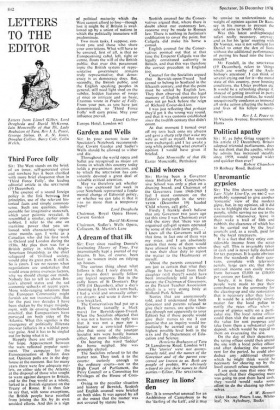LETTERS TO THE EDITOR
Letters from Lionel Gilber, Lord Drogheda and David McKenna, lain Moncreiffe of that llk, Lady Brabazon of Tara, Rev J. L. Peace, George Strinn, D. A. N. Jones, Douglas Collins, Barry Cole, Colin Welch.
Third Force folly
Sir: The West stands on the brink of an inner, self-generated crisis and nowhere has it been clarified with more brief eloquence than in 'Third Force Folly', the leading editorial article in the SPECTATOR (1 9 December).
The essence of a sound foreign policy is the link betweeg, first principles, use of the relevant his- torical facts and simple common- sense. Such are qualities, indis- pensable for imaginative statecraft, which your polemic revealed. It resembled a similar, earlier coun- terblast. I refer to the one on maritime power . that you un- loosed with characteristic vigour some months ago. I write as a Canadian who did his first work in Oxford and London during the 1930s. My plea then was for a British policy in which Anglo- American friendship, as the chief safeguard of 'Civilised society, would play its great part. It still is. So is yours. I see no reason when negotiations are undertaken that would erase prime overseas factors, why we should change our minds. Nobody has to tell us about Bri- tain's altered status and the sad economic setbacks of recent years. More wide-ranging solutions than the European Community might furnish are not inconceivable. But for the past two decades I have been shaken by the tragic misjudg- ment, with its ensuing intellectual mischief, that Europeanisers have purveyed on both sides of the Atlantic. What this signifies is the resurgence of politically illiterate pre-war fallacies in a wishful post- war guise. And it has to be singled out for being what it is.
Happily there are still grounds for hope. Appeasement between the wars reflected popular senti- ment. The campaign for the Europeanisation of Britain does not. Opinion polls are in the dog- house at the moment. But for many years there were few adequate out- lets. on either side of the Atlantic, at the disposal of those who sought to warn against dangers to Britain, and to the free world as a whole, lurked in a British signature on the Treaty of Rome. It is thus fair to say that, with some exceptions, the British people have recoiled from joining the Six by its own unaided efforts. And this is a sign of political maturity which the West cannot afford to lose—though lost it might be if Britain is swal- lowed up by a union of nations in which the politically immature will predominate.
Two main tasks, I suppose, con- front you and those who share your convictions. What will have to be ensured, first of all, is that no Europeanising cabal, left, right or centre, flouts the will of the British public; that over this paramount topic the British system of repre- sentative government remains truly representative; that demo- cracy is as democracy does. But, secondly, the British public, and the English speaking peoples in general, still need light shed on the subtler, hidden features of issues at once so intricate and so basic. Erasmus wrote in Praise of Folly. From your pen, as you have just demonstrated, no 'Third Force Folly' will earn praise. May your influence prevail.


















































 Previous page
Previous page